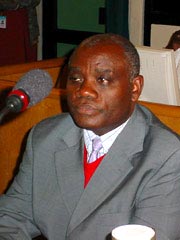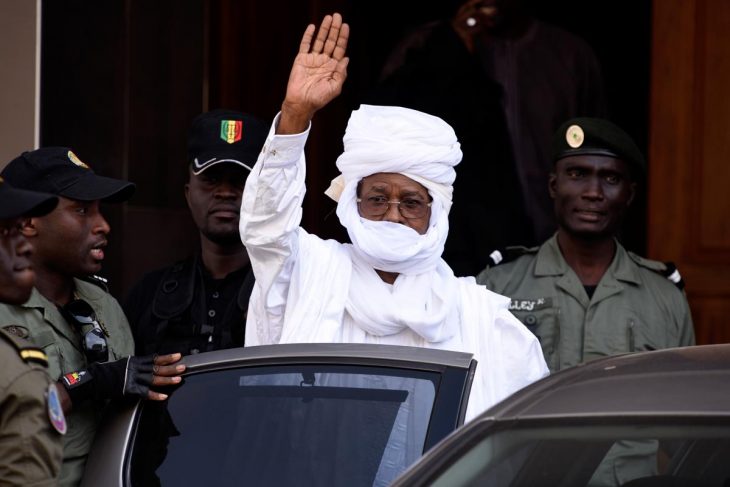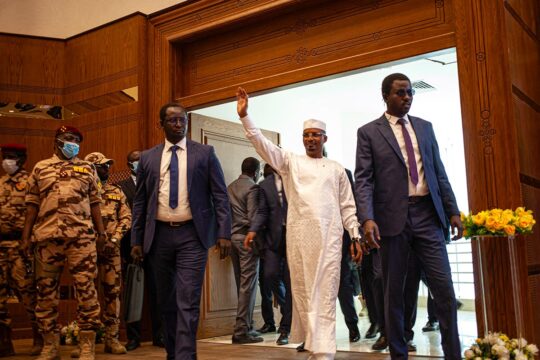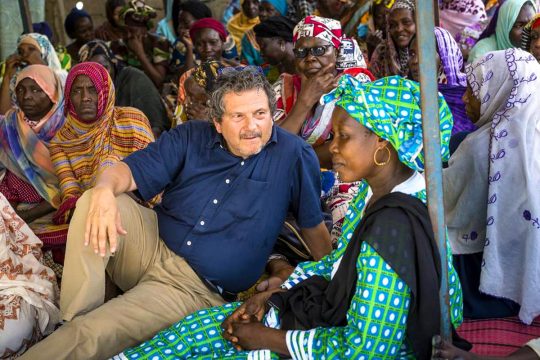Former Chadian president Hissène Habré has been with his family in the Ouakam district of Dakar, the Senegalese capital, since the evening of 6 April. This is under a two-month "permission" granted by the Senegalese justice system to prevent the former dictator from possibly being infected by the new coronavirus in Cap Manuel prison. In its application of 26 March, Habré's defence had argued that, because of his age, he was "particularly vulnerable". This argument convinced the sentence enforcement judge. According to the order, however, Habré is not allowed to leave his residence during the two months and must "return to Cap Manuel prison immediately upon expiry of the authorization to leave".
In Chad, victims still waiting for compensation are angry. "For us this decision is a big blow, it mocks the memory of the victims. We were rather expecting the reparations mechanism to be activated, because nothing has yet moved on that front," says Clément Abaifouta, president of the Association of the Victims of Hissène Habré. Abaifouta, who spent four years in Habré secret jails, finds it inappropriate to invoke humanitarian reasons in the case of the former dictator. "Hissène Habré had no humanity, he had people over 70 years old killed. His victims are sick and continue to die, but when he complains of a cold, people make a fuss. It's not fair. Senegal has turned its back on us," he told Justice Info.
Temporary measure
Hissène Habré ruled Chad from 1982 to 1990, when he was ousted from power by current President Idriss Déby Itno. He took refuge in Dakar, where he was arrested on 30 June 2013. In April 2017 he was convicted of crimes against humanity and sentenced to life in jail by the Extraordinary African Chambers (EAC), a special tribunal established under an agreement between the African Union and Senegal.
Reed Brody, who fought for many years alongside Chadian victims to obtain the trial of Hissène Habré, urges Dakar to ensure strict compliance with the temporary release order. "This release order is only a temporary measure to protect Habré's health and to allow for better prison management in this time of crisis. It is therefore in no way a prelude to a pardon or a release," the American jurist stresses. Brody, who is also an adviser to Human Rights Watch (HRW), hopes "that all necessary measures will be taken to prevent any attempt by Habré to escape and flee" and "to avoid that such permission be accompanied by reprisals against witnesses or civil parties who participated in the trial”.
In addition to life imprisonment, Hissène Habré was sentenced to pay 82 billion CFA francs (125 million euros) to the civil parties. Alain Werner, a member of the civil parties' lawyers' collective in the Habré case, says "the victims we represent have been waiting almost four years for the compensation awarded following the Habré trial. They have not received a single cent and the only thing that seems to be happening in this case still revolves around the issue of his detention, even though he was found guilty after a fair trial of the worst possible crimes under international law”. The Swiss lawyer stresses that "the UN Committee against Torture reminded Senegal in December that early release of perpetrators of the most serious international crimes is not in conformity with obligations under the Convention against Torture".
The Semanza case

So in the current context of the Covid-19 pandemic, should there be temporary conditional release from jail for all vulnerable individuals convicted of serious international crimes?
"In principle, this should be extended to other persons convicted by international tribunals," says Peter Robinson, lawyer for former mayor Laurent Semanza, convicted by the International Criminal Tribunal for Rwanda (ICTR). Robinson filed a request on 16 March for the "immediate provisional release" of his client, "so that he can survive the coronavirus pandemic". Semanza, 76, is currently imprisoned in Benin.
"The circumstances of each case may be different, depending on the age and health of the convicted person, the conditions of detention and the amount of time still to be spent in prison," continued the American lawyer. Semanza, who has already served more than two-thirds of his 34.5-year sentence, is awaiting a decision on his application for early release, filed on 26 July 2018. The general practice in UN courts has been to grant such a release when the convict has served two-thirds of his sentence. However, under the new presidency of the International Mechanism exercising the residual functions of the UN courts (including early release), no ICTR convicted persons have been granted early release.
"I have visited prisons in Benin and Mali where ICTR convicts are serving their sentences,” says Robinson. “The prison in Porto Novo, Benin, is very large and overcrowded, and ICTR prisoners are not separated from other prisoners as they are in the Koulikoro prison in Mali. I don't see how prison officials can prevent the spread of Covid-19 there. It's only a matter of time." The lawyer considers that, for Semanza, "it's a matter of life or death".
Awaiting a decision
In a statement issued on 27 March, the Association of Defence Counsel practising before International Courts and Tribunals (ADC-ICT) urged the "Mechanism" to grant early release to convicted persons who have completed two thirds of their sentences, starting with those who have already applied. For the others, the ADC-ICT suggests that they be granted provisional release measures like Habré. "All prisoners currently serving their sentences in Europe and Benin are elderly and therefore particularly vulnerable. If they catch Covid-19 in prison, their lives will be in danger," the lawyers argue.
Cameroonian lawyer Hugo Jombwe Moudiki worked as an expert for the EAC in the Habré trial. He says he "understands" both "the emotion of the victims" and the humanitarian reasons that led the Senegalese justice system to "grant [Habré] leave permission until the epidemic can be managed". But he is in complete disagreement with a general release initiative. "It does not seem advisable to me that the Covid-19 health crisis should lead to the release of those who have been convicted of international crimes at the ICC or other international criminal tribunals. I believe that international judicial bodies have the means to fight against the contamination of detained persons," says the lawyer.
Senegalese human rights activist Alioune Tine, former Amnesty International Regional Director for West and Central Africa, agrees. "I think we still need criteria in relation to the crimes that have been committed. Some have committed genocide, torture, crimes against humanity. Impunity is not tolerable for crimes of this nature," he said on Deutsche Welle radio on 6 April.
Eyes are now turned to Judge Carmel Agius, president of the Mechanism, whose decision in the Semanza case could be a reference.






